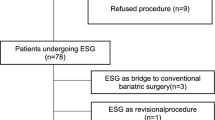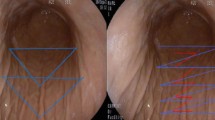Abstract
Introduction
Although primary endoscopic sleeve gastroplasty (P-ESG) is effective, some patients may require revision procedures to augment weight loss. We hypothesized that a non-surgical approach using redo ESG (R-ESG) might be a viable option in such patients. We aimed to assess the safety and efficacy of R-ESG following P-ESG to treat obesity.
Methods
We reviewed the outcome of patients who underwent R-ESG at our unit. We classified them as weight loss failure (WF)—< 10% total body weight (TBWL) at 6-months; weight regain (WR)—lost ≥ 10% TBWL and regained 50% of the maximum weight loss at or after 1-year; weight plateau (WP)—lost ≥ 10% TBWL but could not lose further over 3-months. We analyzed the feasibility, safety, and evaluated the efficacy of R-ESG in each group.
Results
Of the 482 patients who underwent P-ESG, 35 (7%) required R- ESG (WF-12, WR-12, WP-11). The mean age, weight, BMI (38.2 kg/m2), and the number of sutures used during P-ESG were similar between the groups. The nadir %TBWL was lowest in WF group compared to WR and WP (6.5% vs. 20% vs. 22.4%, p = 0.001). The mean BMI at R-ESG was 33.6 kg/m2. The time to R-ESG was longer in the WR group compared to WF and WP (22.3 vs. 13.4 vs. 13.7 months, p = 0.03). We placed a median of 3 (range 2–6) sutures. R-ESG was technically successful, and no serious complications occurred. All except two patients were discharged on the same day. The overall %TBWL achieved by R-ESG was significantly higher in WP (26%) as compared to WF (11.2%) and WR (12%), respectively (p = 0.001).
Conclusion
The need for R-ESG after P-ESG is low. R-ESG is safe and induced weight loss in all patients. The maximum benefit was observed in WP.





Similar content being viewed by others
Abbreviations
- TBWL:
-
Total body weight loss
- EWL:
-
Excess weight loss
- BMI:
-
Body mass index
- ESG:
-
Endoscopic sleeve gastroplasty
- SD:
-
Standard deviation
- WF:
-
Weight loss failure
- WR:
-
Weight regain
- WP:
-
Weight plateau
References
Caterson ID, Alfadda AA, Auerbach P et al (2019) Gaps to bridge: Misalignment between perception, reality and actions in obesity. Diabetes Obes Metab 21:1914–1924
Joseph MS, Konerman MA, Zhang M et al (2018) Long-term outcomes following completion of a structured nutrition and exercise lifestyle intervention program for patients with metabolic syndrome. Diabetes Metab Syndr Obes 11:753–759
Gregg EW, Chen H, Wagenknecht LE et al (2012) Association of an intensive lifestyle intervention with remission of type 2 diabetes. JAMA 308:2489–2496
Look AHEAD Research Group (2014) Eight-year weight losses with an intensive lifestyle intervention: the look AHEAD study. Obesity (Silver Spring) 22:5–13
Buchwald H, Oien DM (2011) Metabolic/bariatric surgery worldwide. Obes Surg 23:427–436
https://asmbs.org/resources/estimate-of-bariatric-surgery-numbers
Ward ZJ, Bleich SN, Cradock AL et al (2019) Projected U.S. state-level prevalence of adult obesity and severe obesity. N Engl J Med 381:2440–2450
Rozier MD, Ghaferi AA, Rose A et al (2019) Patient preferences for bariatric surgery: findings from a survey using discrete choice experiment methodology. JAMA Surg 154:e184375
Lopez-Nava G, Asokkumar R (2019) Step-by-step approach to endoscopic gastroplasty by a novel single-channel endoscopic suturing system. VideoGIE 4:444–446
Lopez-Nava G, Asokkumar R, Rull A et al (2019) Bariatric endoscopy procedure type or follow-up: what predicted success at 1 year in 962 obese patients? Endosc Int Open 7:E1691–E1698
Neto MG, Moon RC, de Quadros LG et al (2019) Safety and short-term effectiveness of endoscopic sleeve gastroplasty using overstitch: preliminary report from a multicenter study. Surg Endosc. https://doi.org/10.1007/s00464-019-07212-z
Barrichello S, Hourneaux de Moura DT, Hourneaux de Moura EG et al (2019) Endoscopic sleeve gastroplasty in the management of overweight and obesity: an international multicenter study. Gastrointest Endosc 90:770–780
Li P, Ma B, Gong S, Zhang X et al (2019) Efficacy and safety of endoscopic sleeve gastroplasty for obesity patients: a meta-analysis. Surg Endosc. https://doi.org/10.1007/s00464-019-06889-6
Lopez-Nava G, Sharaiha RZ, Vargas EJ et al (2017) Endoscopic sleeve gastroplasty for obesity: a multicenter study of 248 patients with 24 months follow-up. Obes Surg 27:2649–2655
Ryan DH, Yockey SR (2017) Weight loss and improvement in comorbidity: differences at 5%, 10%, 15%, and over. Curr Obes Rep 6:187–194
Hajifathalian K et al (2019) Long-term follow up and outcomes after endoscopic sleeve gastroplasty for treatment of obesity (5 year data). Gastrointest Endosc 89(6):58
Lauti M, Kularatna M, Hill AG et al (2016) Weight regain following sleeve gastrectomy-a systematic review. Obes Surg 26:1326–1334
Grupo Colaborativo de la Sociedad Española de Nutrición Comunitaria (2016) Dietary guidelines for the Spanish population (SENC, December 2016); the new graphic icon of healthy nutrition. Nutr Hosp 33:1–48
Abu Dayyeh BK, Bazerbachi F, Graupera I et al (2019) Endoscopic bariatric and metabolic therapies for non-alcoholic fatty liver disease. J Hepatol 71:1246–1248
Asokkumar R, Babu MP, Bautista I et al (2020) The use of the overstitch for bariatric weight loss in Europe. Gastrointest Endosc Clin N Am 30:129–145
Hedjoudje A, Dayyeh BA, Cheskin LJ et al (2019) Efficacy and safety of endoscopic sleeve gastroplasty: a systematic review and meta-analysis. Clin Gastroenterol Hepatol. https://doi.org/10.1016/j.cgh.2019.08.022
James TW, Reddy S, Vulpis T et al (2019) Endoscopic sleeve gastroplasty is feasible, safe, and effective in a non-academic setting: short-term outcomes from a community gastroenterology practice. Obes Surg. https://doi.org/10.1007/s11695-019-04331-3
Baig SJ, Priya P, Mahawar KK et al (2019) Weight regain after bariatric surgery-a multicentre study of 9617 patients from indian bariatric surgery outcome reporting group. Obes Surg 29:1583–1592
Parikh M, Pomp A, Gagner M (2007) Laparoscopic conversion of failed gastric bypass to duodenal switch: technical considerations and preliminary outcomes. Surg Obes Relat Dis 3:611–618
Brethauer SA, Kothari S, Sudan R et al (2014) Systematic review on reoperative bariatric surgery: American Society for Metabolic and Bariatric Surgery Revision Task Force. Surg Obes Relat Dis 10:952–972
ASGE Bariatric Endoscopy Task Force and ASGE Technology Committee (2015) ASGE Bariatric Endoscopy Task Force systematic review and meta-analysis assessing the ASGE PIVI thresholds for adopting endoscopic bariatric therapies. Gastrointest Endosc 82:425–438.e5
Daniel S, Soleymani T, Garvey WT (2013) A complications-based clinical staging of obesity to guide treatment modality and intensity. Curr Opin Endocrinol Diabetes Obes 20:377–388
Wadden TA (1993) Treatment of obesity by moderate and severe caloric restriction. Results of clinical research trials. Ann Intern Med 119:688–693
Alqahtani A, Al-Darwish A, Mahmoud AE et al (2019) Short-term outcomes of endoscopic sleeve gastroplasty in 1000 consecutive patients. Gastrointest Endosc 89:1132–1138
White MA, Kalarchian MA, Masheb RM et al (2010) Loss of control over eating predicts outcomes in bariatric surgery patients: a prospective, 24-month follow-up study. J Clin Psychiatry 71:175–184
Galli F, Cavicchioli M, Vegni E et al (2018) Ten years after bariatric surgery: bad quality of life promotes the need of psychological interventions. Front Psychol 9:2282
Mohan BP, Asokkumar R, Khan SR, Kotagiri R, Sridharan GK, Chandan S, Ravikumar NP, Ponnada S, Jayaraj M, Adler DG (2020) Outcomes of endoscopic sleeve gastroplasty; how does it compare to laparoscopic sleeve gastrectomy? A systematic review and meta-analysis. Endosc Int Open 8:E558–E565
Amiki M, Seki Y, Kasama K et al (2020) Revisional bariatric surgery for insufficient weight loss and gastroesophageal reflux disease: our 12-year experience. Obes Surg. https://doi.org/10.1007/s11695-019-04374-6
Kraljević M, Köstler T, Süsstrunk J et al (2019) Revisional surgery for insufficient loss or regain of weight after Roux-en-Y Gastric bypass: biliopancreatic limb length matters. Obes Surg. https://doi.org/10.1007/s11695-019-04348-8
Alqahtani AR, Elahmedi M, Alqahtani YA et al (2019) Laparoscopic sleeve gastrectomy after endoscopic sleeve gastroplasty: technical aspects and short-term outcomes. Obes Surg 29:3547–3552
Author information
Authors and Affiliations
Corresponding author
Ethics declarations
Disclosures
Dr. Gontrand Lopez-Nava: Consultant for Apollo Endosurgery, USA; USGI Medicial, USA; Nitinotes Surgical, Israel. Dr. Ravishankar Asokkumar, Dr. Anuradha Negi, Mr. Enrique Normand, and Dr. Inmaculada Bautista have no conflicts of interest or financial ties to disclose.
Ethical approval
The study was conducted following the good clinical practice guidelines and adhered to the recommendation of the declaration of Helsinki.
Additional information
Publisher's Note
Springer Nature remains neutral with regard to jurisdictional claims in published maps and institutional affiliations.
Rights and permissions
About this article
Cite this article
Lopez-Nava, G., Asokkumar, R., Negi, A. et al. Re-suturing after primary endoscopic sleeve gastroplasty (ESG) for obesity. Surg Endosc 35, 2523–2530 (2021). https://doi.org/10.1007/s00464-020-07666-6
Received:
Accepted:
Published:
Issue Date:
DOI: https://doi.org/10.1007/s00464-020-07666-6




